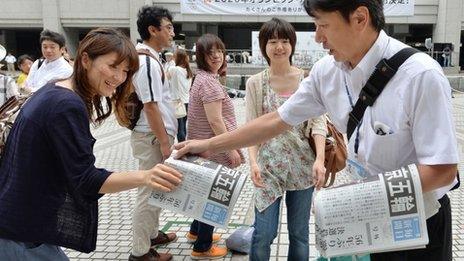Japan media: Euphoria over Olympics
- Published

Most Japanese media had headlines celebrating Tokyo's successful Olympics bid
Japanese media are euphoric about Tokyo being chosen to host the 2020 summer Olympics.
The International Olympic Committee (IOC) on Sunday picked Tokyo over Madrid and Istanbul, possibly helped by Japanese Prime Minister Shinzo Abe's promise that the crisis at the crippled Fukushima nuclear power plant will not affect the country's capital.
The news sparked celebrations in Tokyo.
"Tokyo jubilant over successful 2020 Olympics bid" - this headline on the website of Kyodo news agency, external very much sums up the mood.
Kyodo adds, external that "the mood in Tokyo was ecstatic early on Sunday" and "close to 2,000 people watching a live broadcast of the IOC's general session on a large screen at the Komazawa Olympic Park gymnasium erupted in cheers as IOC President Jacques Rogge opened the envelope holding the results of voting and read the city's name".
"Japan is back in the game big time, tourism-wise, at least, with the news that Tokyo will host the 2020 Games," says The Asahi Shimbun, external.
The paper seems to be in a mood to start preparing for the games early, as it published another report informing "Olympics visitors" about Tokyo's sights.
"Tokyo is home to 265 museums, zoos and botanical gardens, both public and private, wherein are stored 2,371 officially designated national treasures and important cultural properties," the paper says, external.
Business boost
Newspapers feel that the win will help Japan's economy and also boost its image as a tourist destination.
The NHK website, external reports a sense of optimism among Japanese businesses after Tokyo's win.
"Japanese business entities are welcoming Tokyo's winning bid for the 2020 Olympics and Paralympics in the hope it will boost the economy," NHK says.
"A department store in Tokyo's Ikebukuro district put up a 23-metre banner of congratulations as soon as the news ran on television early Sunday morning," it adds.
One customer of the shop told the website that he "may spend more than he expected out of euphoria".
Hiromasa Yonekura, chairman of Japan's biggest business lobby Keidanren, said in a statement that the nation's economic recovery will be spurred on by the games, "building on the momentum of a redeveloped Tokyo, improved infrastructure and attracting foreign tourists".
"As Tokyo prepares for the Olympics, demand for construction projects is expected to increase, with a private research institute projecting a 0.5% rise in Japan's gross domestic product in 2020," says a report in the Mainichi Daily, external.
Some papers also feel the games will boost Japan's image, which recently took a beating over the leakage of radioactive water from the Fukushima plant and a fragile economy.
"Tokyo overcame fears of the dangers of radiation-contaminated water from the Fukushima No. 1 nuclear power plant, crippled by the March 2011 earthquake-tsunami disaster, about 250km (155 miles) north-east of the city to win the vote. It also pressed home the message of using the Olympics as a force in its reconstruction efforts," says a Kyodo report in the Japan Times, external.
Territorial disputes
Despite Tokyo's celebratory mood, some papers in Beijing and Seoul feel Japan needs to address territorial disputes before it can start preparing for the games.
"Despite the distinction between sports and politics, we cannot deny that they are interconnected. Some pundits in Korea have already raised concerns about the possibility that the Abe cabinet's nationalistic inclinations will be reinforced after Tokyo's successful bid for the Olympic Games. Japan must stop escalating conflicts and tensions with its neighbours over territorial and historical issues," says Seoul-based JoonAng Daily, external.
Media in China and Hong Kong are also reminding Tokyo to reflect on its World War II past.
"Japan's understanding and reflection on the history of World War II is very poor by world standards. If Japan loudly hypes up the matter of the Yasukuni Shrine again in the next few years, China and South Korea can take advantage of world public attention on the Olympics to expose the obstinacy and arrogance of Japan's handling of World War II history to the whole world," says China's state-run Global Times, external.
BBC Monitoring, external reports and analyses news from TV, radio, web and print media around the world. For more reports from BBC Monitoring, click here. You can follow BBC Monitoring on Twitter, external and Facebook, external.